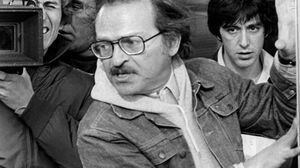Sidney Lumet (1973-1978)

In the mid 1970s, Sidney Lumet cemented his legacy as one of the most versatile and socially conscious directors in Hollywood. Known for his ability to bring out the best in his actors and his preference for stories that grapple with moral and societal dilemmas, Lumet’s output during this period stands as a masterclass in filmmaking. His films from these years not only exemplify his craft but also reflect the turbulent cultural landscape of the decade. Lumet’s work often straddled the line between high art and mainstream appeal, blending gripping narratives with sharp commentary on power, corruption, and human frailty. His commitment to authenticity and his skill at elevating material that could be pedestrian in lesser hands solidify his reputation as a director of extraordinary depth and breadth.
Serpico (1973) Serpico marks Lumet’s first collaboration with Al Pacino, telling the true story of Frank Serpico, a whistleblowing cop who exposed widespread corruption in the New York Police Department. The film is a gritty, unflinching portrayal of a man at odds with a system designed to crush dissent. Lumet’s direction highlights Serpico’s isolation and moral conviction, using New York City not just as a backdrop but as a character unto itself. The grimy, oppressive atmosphere mirrors Serpico’s growing disillusionment, while Pacino’s transformative performance captures both the character’s righteous fury and his vulnerability. Serpico succeeds not only as a taut crime drama but also as a poignant exploration of integrity in the face of overwhelming corruption. Lumet’s ability to weave social commentary into a compelling narrative set a high bar for the decade’s socially conscious cinema.
Murder on the Orient Express (1974) After the gritty realism of Serpico, Lumet shifted gears with Murder on the Orient Express, a lavish adaptation of Agatha Christie’s classic mystery. The film, starring an all-star cast led by Albert Finney as Hercule Poirot, is a dazzling exercise in old-school elegance and meticulous craftsmanship. Lumet creates a sense of opulence and intrigue through lavish production design and exquisite cinematography, while deftly balancing the ensemble cast’s competing star power. The film’s climactic reveal—a morally ambiguous solution to the murder—underscores Lumet’s interest in ethical gray areas, even in a genre typically bound by clear resolutions. While the film lacks the raw emotional punch of Lumet’s grittier works, it stands as a testament to his ability at tackling a wide range of genres with style and precision.
Dog Day Afternoon (1975) Dog Day Afternoon represents Lumet at his most electrifying. Based on a real-life bank robbery gone wrong, the film stars Al Pacino as Sonny, a desperate man whose plan to steal money for his lover’s gender-affirming surgery spirals into chaos. Lumet’s direction is masterful, capturing the raw intensity of the situation while imbuing the film with a surprising amount of humor and humanity. His use of naturalistic lighting and handheld camerawork heightens the film’s sense of immediacy, immersing the audience in the sweltering tension of a Brooklyn summer. Rather than reducing Sonny and his accomplices to caricatures, Lumet and screenwriter Frank Pierson explore their vulnerabilities and motivations with empathy, creating a nuanced portrait of desperation and defiance. Pacino’s performance is nothing short of iconic, while John Cazale’s quiet intensity as Sonny’s partner, Sal, adds depth to the film’s emotional core. The film’s exploration of oppression and identity ensures its relevance decades later. Dog Day Afternoon is a quintessential Lumet film, blending social commentary with gripping drama in a way only he could.
Network (1976) Often considered Lumet’s magnum opus, Network is a scathing indictment of television, corporate greed, and the commodification of human emotion. The film, written by Paddy Chayefsky, tells the story of a struggling news anchor, Howard Beale (Peter Finch), whose on-air breakdown turns him into a ratings sensation. Lumet’s direction amplifies Chayefsky’s razor-sharp script, creating a world that feels both heightened and disturbingly plausible. The ensemble cast delivers powerhouse performances, with Finch, Faye Dunaway, and Beatrice Straight all earning Oscars for their roles. Lumet’s ability to draw exceptional work from his actors is on full display, as is his talent for crafting scenes of almost unbearable tension. The film’s dark humor and prophetic insights into media sensationalism cement its reputation as a biting critique of capitalism and its impact on human dignity, a product of its time and a chilling harbinger of things to come.
The Wiz (1978) Perhaps the most unusual entry in Lumet’s filmography, The Wiz is a reimagining of The Wizard of Oz set in an urban landscape starring Diana Ross as Dorothy and featuring an ensemble cast including Michael Jackson and Richard Pryor. While Lumet’s ambition is evident, The Wiz is ultimately a flawed experiment. The film struggles to balance its lavish musical numbers with a cohesive narrative, and its darker tone clashes with the whimsical spirit of the source material. A rare misstep for Lumet, The Wiz has found a second life as a cult classic, with its bold visuals and standout performances—particularly Jackson’s portrayal of the Scarecrow—earning it a devoted following. While far from Lumet’s best work, the film demonstrates his willingness to take risks and step outside his comfort zone.
Overall Appraisal Between 1973 and 1978, Sidney Lumet delivered a body of work that showcased his unparalleled range and his commitment to tackling complex, morally charged stories. From the gritty realism of Serpico to the prophetic satire of Network, Lumet proves himself a filmmaker of extraordinary depth and versatility. Whether working with hard-hitting dramas like Dog Day Afternoon or star-studded mysteries like Murder on the Orient Express, he brings an authenticity and humanity that resonates deeply. His direction often foregrounds the moral dilemmas of his characters, creating films that are not only entertaining but also intellectually and emotionally engaging, leaving behind a legacy that continues to inspire and challenge viewers. In these five years, Lumet reaffirmed his place among the greatest directors of his generation, a filmmaker whose work remains as vital and impactful today as it was during its original release.
